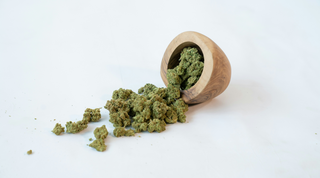
Intro: THCp Is in a Different League
Think you know THC? Meet its overpowered cousin, THCp—aka the cannabinoid that turned seasoned stoners into certified space cadets.
First discovered in 2019, Tetrahydrocannabiphorol (THCp) isn’t just another trendy compound—it’s one of the strongest psychoactive cannabinoids known to science, with research showing it may bind to your brain’s CB1 receptors up to 30x more effectively than standard THC.
But what does that actually mean for your high? Is it better? Stronger? Riskier?
We’re breaking down THCp vs THC in this ultimate guide—so you know what hits, what sticks, and which one belongs in your stash.

What Is THC (a.k.a. the Classic)?
Let’s talk about the OG high.
THC—short for tetrahydrocannabinol—is the umbrella term for several types of cannabinoids that give you that signature cannabis buzz. But in everyday convo, most people just say “THC” when they mean the kind found in weed or hemp-derived products.
Here's what you should know:
- THC = psychoactive — it makes you feel elevated, chill, giggly, snacky, or super philosophical (usually depending on the vibe)
- Found in edibles, vapes, flower, tinctures, and basically every type of cannabis product out there
- Effects are dose-dependent: low = mellow, high = heavy
- Popular with everyone from first-timers to daily users
THC is great for creativity, social hangs, Netflix marathons, or winding down after work. It’s also way more studied and widely available than THCp—making it a trusted go-to.

What Is THCp (Tetrahydrocannabiphorol)?
Now here comes the next-gen cannabinoid you’ve probably seen trending on Reddit or TikTok.
THCp is a rare cannabinoid naturally found in small amounts in cannabis plants. What makes it wild is its chemical structure—it has a longer side chain that allows it to bond way more strongly with your brain’s CB1 receptors.
Translation? It slaps harder. Like… way harder.
- Up to 30x the binding strength of THC at CB1 receptors
- Known for intense, long-lasting psychoactive effects
- Found in microdosed gummies, vapes, and tinctures
- Effects include deep euphoria, body-numbing calm, and time distortion (seriously)
You don’t need much. In fact, most THCp products are stacked with other cannabinoids like CBD or THC just to soften the blow. It’s not for the faint of heart—but if you’re looking to level up, this one’s for you.
THCp vs THC: Key Differences at a Glance
|
Feature |
THC |
THCp |
|
Potency |
Strong, manageable |
Ultra-strong—even at microdoses |
|
Psychoactive? |
Yes |
Yes, but more intense |
|
Experience |
Uplifting, social, creative |
Heady, euphoric, heavy body high |
|
Duration |
2–6 hours |
4–10+ hours (sometimes longer) |
|
Best For |
Daily users, casual chill |
High-tolerance users, nighttime deep calm |
|
Onset Time |
30–60 mins (edibles), quicker with vapes |
Similar timing, but hits harder |
|
Risk of Overdoing It |
Moderate |
High if you don’t dose properly |
|
Availability |
Widely available |
Still niche, but trending fast |

Effects of THC vs THCp: Choose Your High
Let’s break it down by vibe:
THC =
- Boosts mood
- Makes music feel better
- May get you social, snacky, or creative
- Ideal for daytime or social settings
THCp =
- Body-heavy euphoria
- Time-slowing intensity
- Best for lying down and staying down
- Great for deep relaxation, pain relief, or "I’m not leaving this couch" mode
Think of THCp as THC's intense alter ego. If THC is your day-drinking friend, THCp is the one who shows up to the party with a full ritual setup and sage in their bag.

Safety Considerations: Respect the Potency
Okay, we need to talk.
THCp is not “more THC.” It’s a completely different beast, and if you dose it like you would a regular THC gummy… you’re gonna have a main character moment, and not in a good way.
Safety tips:
- Start with microdoses (1–2mg of THCp is A LOT)
- Always check for lab-tested COAs
- Don’t mix with alcohol or other cannabinoids until you know how it hits you
- Try it in a chill space (not at the mall or your cousin’s wedding)
- Give it time to kick in—don’t double dose too soon
Pro tip: First time trying THCp? Grab your comfiest hoodie, your fave playlist, and block off your schedule. You might be here a while.

Legal Status: Is THCp Legal?
Here’s where it gets murky.
Yes, THCp is federally legal if it’s derived from hemp and the product contains less than 0.3% Delta 9 THC by dry weight.
But it’s not regulated like THC, and some states are cracking down on high-potency hemp cannabinoids.
Every state’s rules are different—so don’t assume just because you can buy it online, it’s legal in your zip code. And always, always buy from brands (like us) that back their products with full transparency and lab testing.
Conclusion: THC vs THCp — Which One’s Right for You?
-
THC = your trusted go-to for daily chill and creative sparks
-
THCp = the bold choice for deep calm, high tolerance, or next-level relaxation
Both have their place. It’s all about knowing your goals, your tolerance, and your vibe.
Ready to try THCp without getting wrecked?
Check out hhemp.co’s lab-tested, microdosed THCp products—where plant power meets precision dosing.



